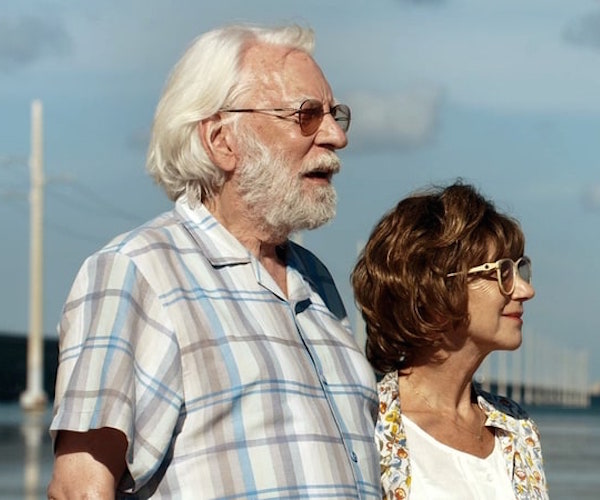Film Review: “The Leisure Seeker” — One Last Road Trip?
We’re not in European art film territory here.
The Leisure Seeker, directed by Paolo Virzi. Screening at Kendall Square, Cambridge, MA, and West Newton Cinema.

Donald Sutherland and Helen Mirren in “The Leisure Seeker.”
By Peg Aloi
When two iconic thespians well past middle age join forces to make a film that is part comedy and part tear-jerker, it ought to be a recipe for box office gold. But The Leisure Seeker, which stars Helen Mirren and Donald Sutherland as a married couple who take their vintage Winnebago on an extended trip, is a bumpy ride. Helmed by director Paolo Virzì, a number of things had to come together to make this ambitious film so mediocre. It’s difficult to imagine either of these performers turning in a lackluster performance, but the poorly written dialogue must have been a struggle to transcend.
Mirren and Sutherland play Ella and John Spencer, an elderly couple beset by health issues who seemingly have nothing to lose by taking an ill-advised journey in their old camper van, which blows out billowing white smoke behind it as they trundle down the highway, swerving and careening from Wellesley, Massachusetts to Key West, Florida.
The film opens when the Spencers’ son Will (English actor Christian McKay) arrives at their handsome suburban home in Wellesley, talking on the phone to someone about how he will stay with his father while his mother is in the hospital. Right off the bat, this movie tells us things instead of showing them to us. (I am pretty sure clumsy expository dialogue is one of the first things they teach you not to do in screenwriting class.) We cut to Ella and John in their 1970s era Winnebago, somewhere in the South (as evidenced by their stop at a Stuckey’s). In what could kindly be described as a passable Southern accent (that slips in and out throughout the entire film), Mirren blathers on to the gas station attendant about having been born in South Carolina and how much she loved bringing her children pecan loaves from Stuckey’s.
We learn that the couple is on its way to Key West to visit Ernest Hemingway’s house. John is a former English professor whose specialty is that writer. In fact, when the academic is not in a confused state brought on by his steadily-encroaching dementia, he is holding forth on Hemingway to anyone who will listen (usually an unsuspecting waitress, including one who, rather incredibly, claims to have written her honors thesis on The Old Man and The Sea). As the couple makes its way down the eastern seaboard stopping at campsites and tourist attractions along the way, John’s confusion and memory loss are a source of frustration for Ella, who is herself in a weakened state from, we soon find out, the end stages of cancer.
Helmed by Italian director Paolo Virzì, a number of things had to come together to make 'The Leisure Seeker' so mediocre.Click To TweetMeanwhile, back in Wellesley, Will is in a panic and calls his sister Jane (Janel Moloney) who is also a professor. The two siblings’ friendly rivalry (mainly Will’s thinking their parents “approve” of Jane more and think him to be unambitious — all learned, again, through expository dialogue) plays itself out as they try to figure out what to do about their missing parents. Neighbor Lillian (Dana Ivey) is also worried and tells them she heard an engine start in the early morning. This is how Will and Jane figure out that their parents have left on a very unwise roadtrip. When Ella finally answers one of Will’s phone calls, she calmly tells him not worry and that she and his father need this last trip together.
Despite the film’s generally implausible plot and heavy-handed dialogue, the story has moments of intimacy and pathos that some viewers will no doubt find appealing, particularly given that Mirren and Sutherland are involved. It doesn’t take long to ignore Mirren’s uneven accent in order to marvel at how her grace as an actress helps her rise above this problematic screenplay. As a woman struggling to orchestrate one last memorable experience to celebrate her loving marriage, Mirren’s Ella is at her most appealing when she decides she’s had enough. Her level of frustration escalates as various problems and revelations present themselves; her husband’s hygiene problems and his tendency to drive unsafely are minor matters compared to the shocking exposure of a youthful indiscretion that John reveals in a moment of confusion. Somehow they work it out and continue onwards, finally arriving at the legendary Hemingway house, full of cats and tourists.
In a more deftly-written film, I could see the events leading up to its dramatic conclusion being conveyed poignantly, tinged with darkness and the horror that comes when confronting mortality. But this is far from a Michael Haneke film, endlessly unspooling malice: these Hollywood-approved characters do not act out of blithe selfishness or dispassion without getting called out on it, and no bad behavior is unredeemed. John and Ella’s love is what we’re supposed to remember about them, not the indignities of old age or the quiet, rage-filled musings of a decades-long marriage. All is forgiven and wrapped up rather neatly — there is slightly more joy than sadness. We’re not in European art film territory here. Oh, but if we had been, I think Mirren and Sutherland, whose chemistry is unmistakable, would have been so much more memorable than they are. I hope a project with greater finesse pairs them together again before too much time passes.
Peg Aloi is a former film critic for The Boston Phoenix. She taught film and TV studies for ten years at Emerson College, and currently teaches at SUNY New Paltz. Her reviews also appear regularly online for The Orlando Weekly, Cinemazine, and Diabolique. Her long-running media blog “The Witching Hour” can be found at themediawitch.com.
